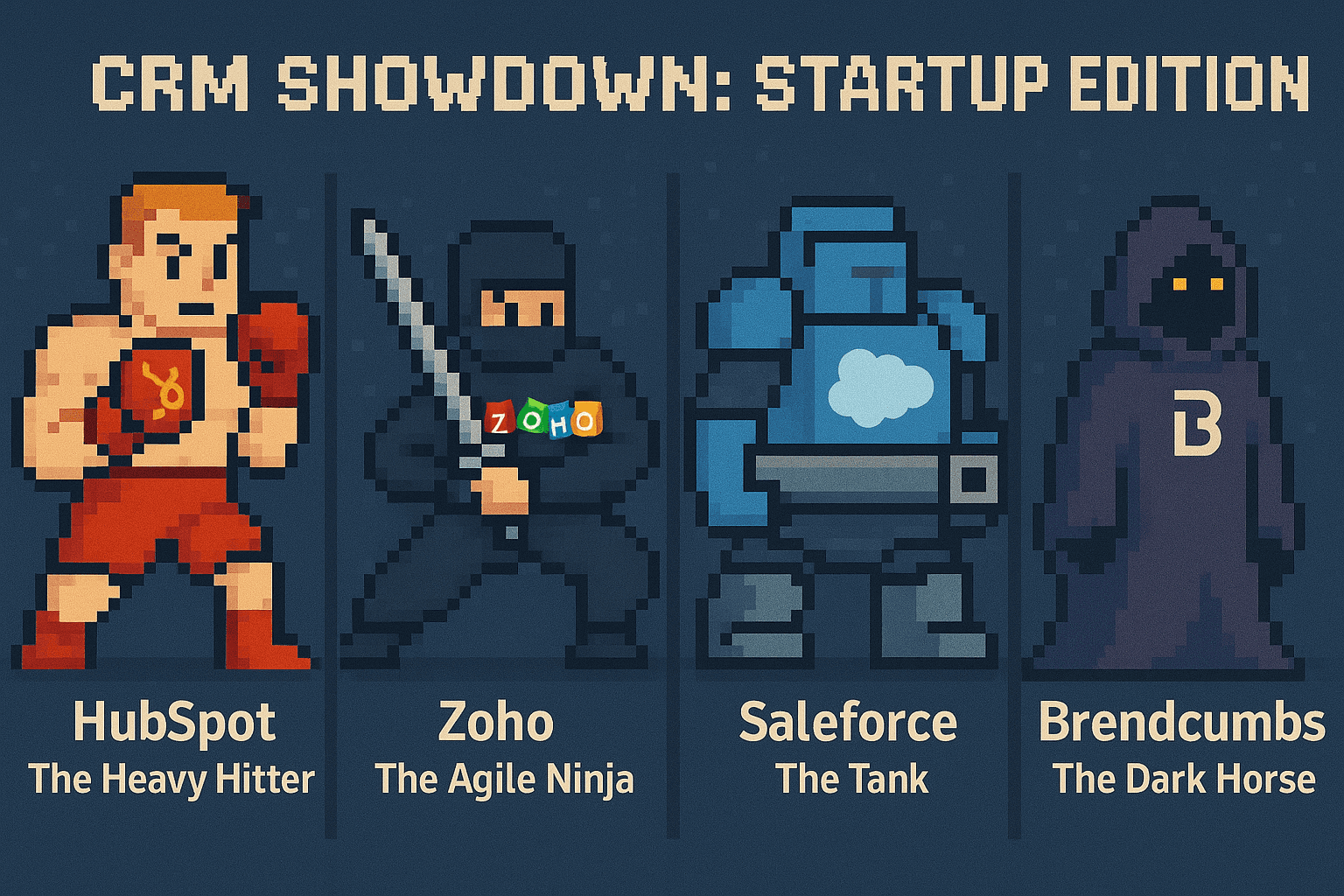When first-time founders evaluate CRM and lead management solutions to handle their first 100 leads, it is essential to consider three critical factors: features, pricing, and lead management effectiveness. This section provides an updated, comprehensive comparison of four popular platforms: HubSpot, Zoho CRM, Salesforce, and Breadcrumbs.
1. Features Comparison
HubSpot
HubSpot offers an integrated suite combining marketing, sales, service, content, and operations tools under one platform. It includes AI-powered lead capture, qualification, nurturing, and pipeline tracking. Automation for follow-ups and lead nurturing is built-in, alongside tools for forms, landing pages, live chat, and robust analytics dashboards. HubSpot’s AI Prospector helps identify and engage high-value leads, and the platform supports extensive third-party app integrations. It scales well from startups to large enterprises .
Salesforce
Salesforce provides comprehensive lead management features such as lead capture, scoring, nurturing, and conversion. Its Einstein AI prioritizes leads, predicts conversion probabilities, and recommends actions. The AI Assistant "Agentforce" automates interactions and coaches sales reps. Salesforce offers omnichannel engagement across web, mobile, Slack, and WhatsApp, industry-specific clouds, and connects to other systems via MuleSoft. Advanced reporting and forecasting tools provide deep insights .
Zoho CRM
Zoho CRM includes core modules (Leads, Contacts, Accounts, Deals) with an AI assistant called Zia, which predicts lead conversion, automates routine tasks, and gives recommendations. It supports workflow automation, omnichannel communication (email, telephony, social media), and high customization of modules, fields, and pipelines. Zoho’s lead scoring is points-based, facilitating prioritization. The platform offers campaign management as well as GDPR and HIPAA compliance, and supports over 1,000 third-party integrations .
Breadcrumbs
Breadcrumbs is not a standalone CRM but a revenue acceleration and lead scoring platform that enhances existing CRMs (like HubSpot and Salesforce). It uses AI and machine learning to create dynamic, customizable lead scoring models, consolidates sales, marketing, and product data, and allows filtering and segmentation via its Explore feature. Its primary role is to improve lead prioritization within your existing CRM, not to replace it .
2. Pricing Structures
HubSpot
Offers free tools for up to 2 users across sales, marketing, service, and content. Starter plans start at $20/month per hub, with the CRM Suite Starter at $50/month including marketing, sales, and service tools for up to 1,000 contacts and 2 users. Higher tiers include onboarding fees and expanded functionalities .
Salesforce
Essentials edition costs $25/user/month (annual billing), suitable for up to 10 users managing 100 leads. Higher editions provide greater automation and customization, with pricing scaling by user count .
Zoho CRM
Starter Plan priced at approximately $7–$8/user/month (annual billing), supporting up to 100 users. It allows unlimited leads within storage limits but restricts some automation and integration features. Additional plans unlock more capabilities .
Breadcrumbs
Provides a free plan to score up to 10,000 contacts with limited features. Paid plans begin at $499/month for 2,000 scored contacts with premium integrations, scaling up to enterprise plans with unlimited contacts and real-time data refresh. As an add-on, pricing complements your primary CRM investment .
3. Lead Management Effectiveness for the First 100 Leads
HubSpot
Its ease of use suits small teams with few users, offering automated lead nurturing and strong visibility. Reported user benefits include 129% more leads and 36% more deals closed within the first year. AI-powered lead prioritization helps focus efforts on high-value prospects .
Salesforce
Salesforce Essentials efficiently manages 100 leads and scales as lead volume grows. Einstein AI enables intelligent lead routing and prioritization, with robust automation ensuring timely engagement across multiple channels. The platform’s customization is notable but may be more complex than necessary for very small teams .
Zoho CRM
The Starter plan easily supports processing 100 leads with AI-powered lead conversion predictions and workflow automations that save time on nurturing and follow-up. It presents a cost-effective option for small teams though some advanced functions are reserved for higher tiers .
Breadcrumbs
Excelling in lead scoring optimization, Breadcrumbs refines scoring models to highlight the most conversion-ready leads from your prospects. It integrates into existing CRMs rather than serving as lead storage, providing significant value for teams focused on maximizing lead engagement efficiency, especially when paired with marketing automation. For very small teams, it may be more functionality than needed .
Summary Recommendations for Managing Your First 100 Leads
- HubSpot is ideal for startups and small teams seeking a free or low-cost, easy-to-use system with integrated marketing and AI-powered sales tools.
- Salesforce suits growth-oriented teams anticipating complex automation and future scalability, with a robust AI suite and omnichannel support but requires a steeper learning curve.
- Zoho CRM offers a budget-friendly, AI-assisted platform suitable for small teams but with some feature limitations at the entry level.
- Breadcrumbs should be considered as an advanced lead scoring enhancement layered on top of your main CRM platform to boost lead prioritization and marketing-sales alignment.
Choosing the right CRM depends on your startup’s immediate needs, budget, team size, and anticipated growth trajectory. Starting with free or low-cost trials is advisable to determine the best fit.

